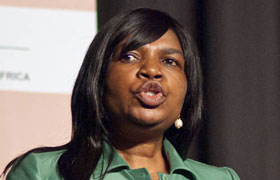
South Africa’s migration from analogue to digital terrestrial television is likely to face further significant delays after the department of communications elected on Monday to file an application for leave to appeal a case which free-to-air broadcaster e.tv won recently against communications minister Dina Pule over who will control the encryption system to be used in the switchover.
As recently as last week, the department was still mulling its options in the case, which saw South Gauteng high court judge CG Pretorius ruling that Pule overstepped legal boundaries in determining that state-owned broadcasting signal distributor Sentech would manage the conditional access system for digital terrestrial television. This system, also known as the control system, is a crucial component in ensuring the set-top boxes that consumers have to buy to receive digital signals comply with a minimum set of standards and prevent, among other things, grey imports of cheap alternatives.
Government is planning to subsidise as many as 5m of these boxes for poorer households.
Former communications minister Roy Padayachie had supported a move for e.tv and the public broadcaster, the SABC, to manage the conditional access system. However, in May 2012, Pule decided that the system should be managed instead by Sentech, prompting the urgent legal action from e.tv.
Pule’s spokesman, Siya Qoza, said in a statement on Monday that the decision to seek leave to appeal was taken after “considering the implications of the judgment on other broadcasters, particularly potential broadcasters, in line with the broadcasting digital migration policy”.
“The appeal will be lodged today [Monday],” Qoza said. “The department is also consulting with existing broadcasters and Icasa on the role of each party in the implementation of the conditional access as per the court judgment.”
E.tv chief operating officer Bronwyn Keene-Young could not immediately be reached for comment on Monday.
The high court found in December that Pule’s decision to hand over management of the conditional access system to Sentech was “unlawful” and awarded costs to e.tv. The judge found that the minister had “no legal power to prescribe or make binding decisions relating to set-top box control” and added that the Independent Communications Authority of South Africa was the only entity entitled to regulate the system.
The decision to seek leave to appeal looks set to throw the entire digital migration process back again. Migration has already been delayed by years, not least by a decision by former communications department director-general Mamodupi Mohlala to entertain the possibility of South Africa switching away from its commitments to the European standard for digital broadcasts to a hybrid Japanese-Brazilian alternative. After a year of debate, and after Mohlala had left the department, South Africa settled on the second generation of the European standard.
South Africa is meant to complete its migration to digital television by no later than mid-2015 if it’s to meet a deadline set down by the International Telecommunication Union. It looks increasingly unlikely that the deadline will be met.
This is problematic for the telecommunications industry, which is desperate for access to the radio frequency spectrum that will be freed up through migration. The spectrum in question, around the 800MHz band, is ideally suited for building next-generation broadband networks outside South Africa’s main urban centres. — (c) 2012 NewsCentral Media




